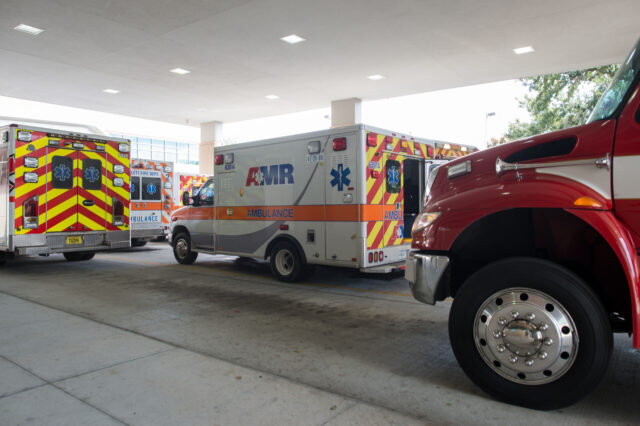UF Health plays vital role in patient care after Hurricane Michael hits Panhandle hospitals

While the Gainesville area was spared a direct hit from Hurricane Michael, University of Florida Health has played a vital role in the disaster response.
On Thursday afternoon, UF Health Shands Hospital received its first patients from storm-damaged hospitals in the Panhandle. By 4 p.m., 19 patients had been brought in by ambulance and plans were in place to accommodate receive more in the next 24 hours.
The arriving patients were first brought to the emergency room with plans for rapid admission to hospital rooms, said Brandon Allen, M.D., medical director of the adult emergency department at UF Health Shands Hospital and an assistant professor in the UF College of Medicine’s department of emergency medicine. Several additional physicians were brought in to the emergency room to help expedite admissions.
“We’ve had great collaboration with admissions and our other hospital services. We’re ready to take on whatever comes to us,” Allen said.
Wendy Swan, M.S.N., R.N., NE-BC, director of emergency services for UF Health Shands emergency departments, said additional emergency roon and inpatient staff were brought in Thursday to help with patients arriving from Panhandle hospitals. A unit within the E.R. was set aside to screen those patients, she said.
Before the storm hit, UF Health ShandsCair helicopters in the north central and Panhandle regions were repositioned for optimal response when the winds subsided. At dawn Thursday, ShandsCair flight crews based in Gainesville, Perry and Milton were poised to take patients from storm-damaged hospitals to Pensacola and Gainesville, said Ed Crews, ShandsCair program director.
As of mid-afternoon Thursday, ShandsCair flight crews had transported six patients from Panhandle hospitals to other facilities and more flights were expected later in the day, he said. After all medical evacuations are completed, Crews said he anticipated that ShandsCair flight crews would be called on to assist with rescue operations involving storm victims.
ShandsCair’s role also involved more than the flight crews: Because communications systems in the region were damaged, ShandsCair’s Med-Trans regional aviation manager was called on to coordinate the entire air medical response from the state's Emergency Operations Center.
UF Health is well-equipped to handle medical flight and patient care needs during hurricanes and other large-scale emergencies, said Ed Jimenez, CEO of UF Health Shands. The hospital system trains regularly and has substantial experience handling such incidents, he added.
“We are used to admitting about 160 patients a day to UF Health Shands. We have expert staff trained to adapt operations in situations such as this,” Jimenez said.
About the author
